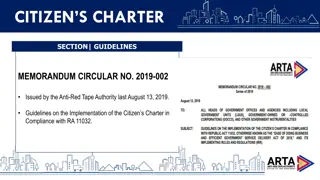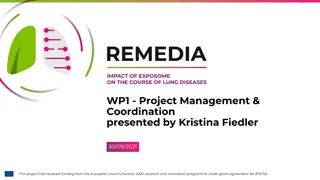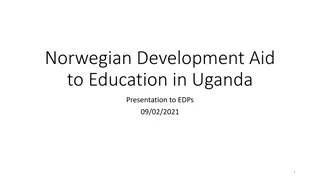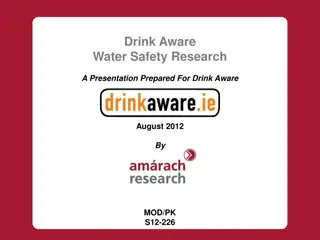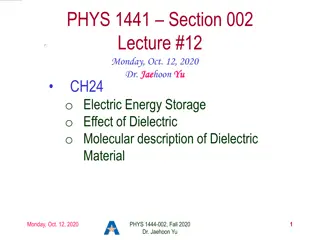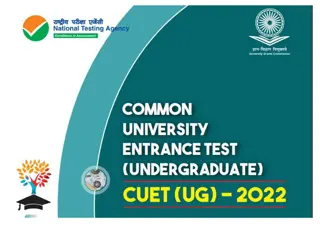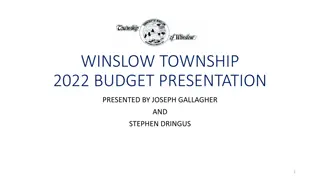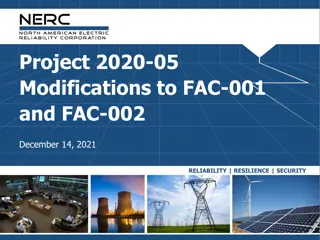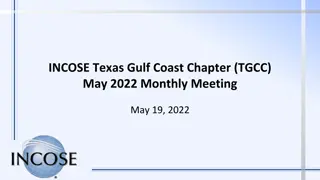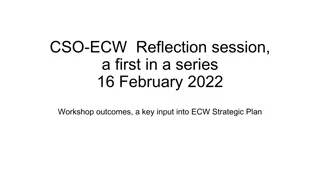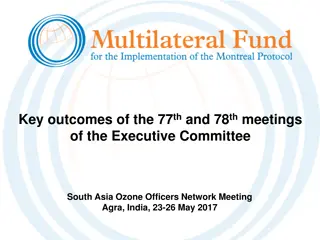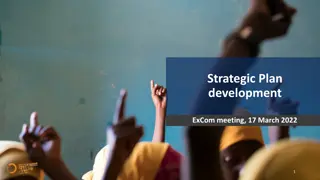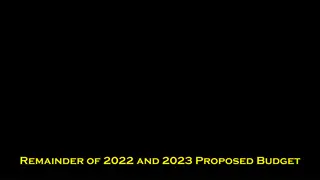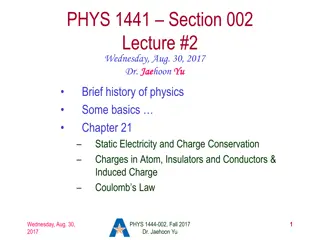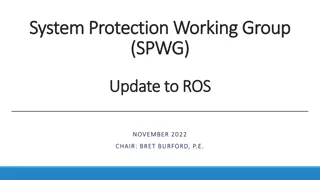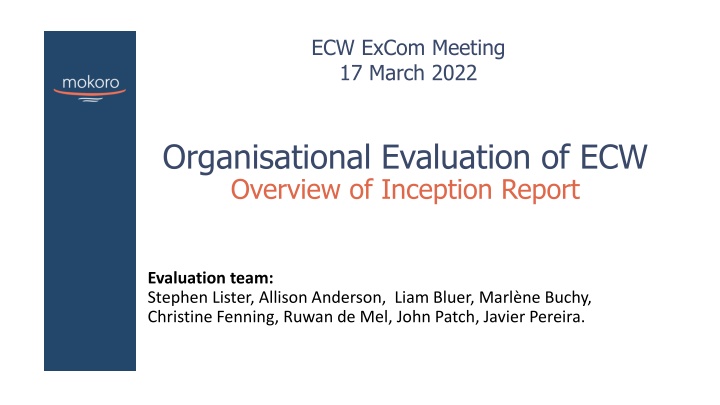
Organisational Evaluation of ECW: Overview and Scope
"Learn about the detailed methodology and work plan presented in the Inception Report for the Organisational Evaluation of ECW. The evaluation focuses on ECW's performance in achieving systemic outcomes and its governance structures since 2017. Explore the objectives of the evaluation and its key focus areas, including progress assessment and stakeholder roles. Discover how ECW aims to strengthen its systems and programme modalities to address future challenges effectively." (Characters: 500)
Download Presentation

Please find below an Image/Link to download the presentation.
The content on the website is provided AS IS for your information and personal use only. It may not be sold, licensed, or shared on other websites without obtaining consent from the author. If you encounter any issues during the download, it is possible that the publisher has removed the file from their server.
You are allowed to download the files provided on this website for personal or commercial use, subject to the condition that they are used lawfully. All files are the property of their respective owners.
The content on the website is provided AS IS for your information and personal use only. It may not be sold, licensed, or shared on other websites without obtaining consent from the author.
E N D
Presentation Transcript
ECW ExCom Meeting 17 March 2022 Organisational Evaluation of ECW Overview of Inception Report Evaluation team: Stephen Lister, Allison Anderson, Liam Bluer, Marl ne Buchy, Christine Fenning, Ruwan de Mel, John Patch, Javier Pereira.
Role and focus of Inception Report IR sets out a detailed methodology and work plan for the OrgEval Presentation highlights main features Special attention to links with Strategic Plan process 17 March 2022 2 Organisational Evaluation of ECW - presentation of Inception Report to ExCom
Evaluation scope The evaluation is to cover the period since ECW's inception in 2017, and to focus on the strategic plan period from April 2018 to the end of 2022. The TOR describe the evaluation scope as follows: The evaluation will assess ECW s performance in achieving its five systemic outcomes as laid out in its strategic plan.It will look at how ECW's governance and management structures, processes, systems, and operations contribute to the five systemic outcomes in an effective and efficient manner. (TOR 18) The evaluation is not expected to assess or directly measure the causality between ECW's grants and beneficiary outcomes but it "is expected to use the aggregated evidence that is available on portfolio level to assess progress to the beneficiary outcomes, and to what extent ECW created an enabling working environment and organizational set-up to do so well". (TOR 22) Unless otherwise stated ECW refers to the ECW Secretariat and its governance. (TOR 17) 17 March 2022 3 Organisational Evaluation of ECW - presentation of Inception Report to ExCom
TOR - objectives The evaluation s purpose is to assess ECW's achievements and lessons learned so far and provide recommendations on how ECW can further strengthen its systems, strategies, and programme modalities to contribute best to solving the EiEPC challenges that lie ahead. From this purpose, the overarching objectives of the evaluation are as follows: 1. To evaluate and understand what aspects of ECW s organization and strategic approaches are working and which need improvement. 2. To determine the extent to which the ECW operational model and its programme modalities are fit for purpose. 3. To evaluate progress towards results and whether ECW Secretariat, ExCom, HLSG, and its broader partnership including UNICEF as the host of the fund are fulfilling their expected roles and responsibilities effectively and efficiently. 4. To communicate findings, conclusions, and recommendation for the way forward to all stakeholders in an effective way and influence the design of ECW s new strategic plan to commence in January 2023. 17 March 2022 4 Organisational Evaluation of ECW - presentation of Inception Report to ExCom
Inception phase work IR builds on: Review of ECW origins and evolution, including analysis of portfolio to date (Chapter 2 and Annex F) Stakeholder analysis (Annex E) ECW briefings and preliminary interviews with selected stakeholders (Annex B lists people consulted) Synthesis of FER and MYRP findings, linked to OrgEval EQs (Annex J) Revised IR takes account of valuable comments on the first draft. 17 March 2022 5 Organisational Evaluation of ECW - presentation of Inception Report to ExCom
Main elements of methodology Build on findings from FER and MYRP evaluations (Annex J) plus nested evaluation of Acceleration Facility (Annex K) Stakeholder analysis Theory-based approach: organisational fitness framework feeds into analytical theory of change Structured EQs and evaluation matrix Gender and equity approach 17 March 2022 6 Organisational Evaluation of ECW - presentation of Inception Report to ExCom
Levels of analysis OrgEval addresses three interdependent levels of analysis: Global strategic level considering ECW's place in the evolving EiEPC ecosystem, and the extent to which ECW is fulfilling its original ambitions. Organisational and institutional level (organisational fitness) how well ECW as an organisation is configured both to deliver on its global and country-level strategic ambitions (linked to ECW's chosen core functions) and to ensure continuing effectiveness, efficiency and sustainability in the delivery of its chosen instruments. Operational level including recommendations about optimising configuration and deployment of ECW modalities and instruments. We thus see organisational fitness as the meso-level of enquiry considering how the locations, structures, systems, staffing, culture and procedures of ECW serve (a) the front- line day-to-day implementation of its operational modalities and (b) ECW's place in, and contributions to, the global EiEPC architecture, and to systemic strengthening at both global and country levels see Organisational Fitness diagram. 17 March 2022 7 Organisational Evaluation of ECW - presentation of Inception Report to ExCom
Organisational Fitness Framework 17 March 2022 8 Organisational Evaluation of ECW - presentation of Inception Report to ExCom
Organisational Fitness links to ToC OrgEval theory of change is set up to investigate the key dimensions of organisational fitness ToC assumptions focus on success factors for ECW performance (next two slides) 17 March 2022 9 Organisational Evaluation of ECW - presentation of Inception Report to ExCom
ECW OrgEval Theory of Change 17 March 2022 10 Organisational Evaluation of ECW - presentation of Inception Report to ExCom
Theory of Change Assumptions ECW partnership is well articulated within the wider humanitarian and development framework ECW positioning is appropriate, and ECW has systems for monitoring and feedback that allow adjustments to ensure continuing relevance and coherence. ECW is well organised and has the capacity to support effective advocacy at global and country levels ECW is able to monitor its direct and indirect contributions to resource mobilisation. Existing systems for coordinating humanitarian and development support to education are conducive to joint planning and monitoring. ECW is well organised and has the capacity to support joint planning and review processes at country level. ECW is well organised and has the capacity to select, approve and follow through appropriate investments. ECW processes are able to support systemic strengthening at country level. ECW policies, procedures and organisational culture ensure proper focus on gender, diversity and accountability. 1. 2. 3. 4. 5. 6. 7. 8. 9. 10. There are clear and appropriate lines of accountability for the planning and delivery of EiEPC. 11. ECW is well organised and has the capacity to monitor the use and effectiveness of its direct inputs, and contribute to wider monitoring, evaluation and learning at country and global levels 12. ECW is well organised and has the capacity to monitor and assess its allocation and use of resources. 13. ECW is able to collaborate with other partners in monitoring and measuring (collective) beneficiary outcomes 14. ECW is able to monitor the beneficiary incidence of its programmes and promotes collective attention to gender and social inclusion dimensions. 17 March 2022 11 Organisational Evaluation of ECW - presentation of Inception Report to ExCom
EQs and evaluation matrix Four main EQs: Is ECW doing the right things? (findings) Is ECW doing things right? (findings) What explains what is working well/not so well? (from findings to conclusions) What therefore should ECW do next? (from conclusions to recommendations) These main questions will provide the structure for the evaluation report. Evaluation matrix (Annex I) links EQs to: Evaluation criteria ToC assumptions Lines of analysis / indicators Sources of evidence Triangulation and strength of evidence The evaluation matrix is the operational guide for the evaluation team s work and a format for assessing evidence. 17 March 2022 12 Organisational Evaluation of ECW - presentation of Inception Report to ExCom
Key Question 1: How relevant and coherent is the role of ECW as the global fund for education in emergencies and protracted crises (EiEPC)? EQ1.1 To what extent have the global EiEPC institutional set-up and eco- system strengthened since the 2016 World Humanitarian Summit (WHS)? EQ1.2 At global level, how well does ECW complement and add value to the broader EiEPC institutional set-up and eco-system? EQ1.3 At country level, how well do ECW's funding modalities complement and add value to other country-level initiatives? EQ1.4 How clear and relevant are ECW's strategy and its associated theory of change (ToC)? 17 March 2022 13 Organisational Evaluation of ECW - presentation of Inception Report to ExCom
Key Question 2: To what extent is ECW fulfilling the core functions and achieving the systemic outcomes set out in its strategy? EQ2.1 To what extent has ECW helped to strengthen the level and quality of political commitment to EiEPC at global and country levels? EQ2.2 To what extent have ECW s resource mobilization strategy and approaches been successful at global and country levels? EQ2.3 To what extent has ECW promoted quality joint planning and review processes through its programmes? EQ2.4 To what extent has ECW strengthened global and country-level capacities in EiEPC programming and coordination? EQ2.5 To what extent has ECW contributed to increased learning and accountability in EiEPC programming and coordination? EQ2.6 To what extent has ECW's investment portfolio contributed to the beneficiary outcomes specified in its results framework (including gender and social inclusion dimensions)? EQ2.7 What other direct or indirect unintended systemic results have been achieved with ECW s establishment and functioning? 17 March 2022 14 Organisational Evaluation of ECW - presentation of Inception Report to ExCom
Key Question 3: What are the main factors that explain the successes and limitations of ECW's performance? EQ3.1 How efficient has ECW been in terms of timely and transparent processes for its investment windows? EQ3.2 How effective and efficient have ECW's overall governance arrangements been? EQ3.3 How efficient has ECW been in terms of geographical and thematic balance (including gender and diversity dimensions) in its investment portfolio? EQ3.4 How efficient has ECW been in terms of proportionate and economical uses of ECW and grant recipient resources (human and financial)? EQ3.5 Organisational fitness: how well has ECW's organisation supported its performance in terms of: the Secretariat's structure, size, locations, coherence and communications? human resources and skills an organisational culture that reflects its objectives and values, including those for gender and equity? systems and processes for resource mobilisation? systems, processes and guidance for grant management? systems and processes for monitoring, performance management and learning? EQ3.6 To what extent have ECW's technical and cross-cutting functions (including on education, gender accountability, MHPSS, M&E, reporting, and risk management) been working well in supporting progress towards the systemic and beneficiary outcomes? EQ3.7 What have been the strengths and weaknesses of ECW's hosting arrangements? EQ3.8 To what extent have ECW partners and other stakeholders aligned and harmonized their policies, plans and programmes to achieve ECW s expected strategic results, and what has ECW done well/less well to influence this? 17 March 2022 15 Organisational Evaluation of ECW - presentation of Inception Report to ExCom
Key Question 4: How can ECW strengthen its positioning and performance over the next strategic period? EQ4.1 How can ECW and its partners continue to strengthen the global framework for EiEPC? EQ4.2 What should be ECW's strategic priorities and level of ambition for its next strategic period? EQ4.3 How should ECW strengthen its investment modalities and overall portfolio? EQ4.4 How can ECW as an organisation strengthen its ability to deliver at both strategic and operational levels? 17 March 2022 16 Organisational Evaluation of ECW - presentation of Inception Report to ExCom
Gender and Equity Approach Gender specialist on the team, with dual role: (a) ensure mainstreaming of gender and diversity across the evaluation; (b) conduct her own data collection and analysis at three levels of the evaluation: Strategic level: review quality of gender instrument and their uptake by secretariat staff Organisational level: Apply selected UNCT SWAP gender scorecard indicators Strategic and organisational analysis will help to test ToC assumption 9: ECW policies, procedures and organisational culture ensure proper focus on gender, diversity and accountability. Operational level: review recent ECW operational guidelines and successful grantee proposals for broad view on the translation of theory into practice. ECW has agreed to a small contract amendment to allow some additional support to the gender analysis within the time constraints of OrgEval. 17 March 2022 17 Organisational Evaluation of ECW - presentation of Inception Report to ExCom
Data Collection Comprehensive review of operational governance documentation Nested AF evaluation (including its own KIIs and e-survey of grantees) FER and MYRP evaluation synthesis and follow up of management responses Analysis of overall grant portfolio KIIs Regular exchange and consultation on the Strategic Planning process 17 March 2022 18 Organisational Evaluation of ECW - presentation of Inception Report to ExCom
Timetable 17 March 2022 19 Organisational Evaluation of ECW - presentation of Inception Report to ExCom
Emerging Issues for review (1) ECW as an evolving organisation Does ECW need more formal structures to operate at scale? If so, how to retain ability to be innovative and entrepreneurial? Are current governance arrangements effective for both advocacy and oversight? Partnerships Quality of partnerships and ECW's effectiveness as a partner? Realism vs. ambition Appropriate level of ambition? Importance of catalytic/multiplier effects Breadth vs. depth 17 March 2022 20 Organisational Evaluation of ECW - presentation of Inception Report to ExCom
Emerging Issues for review (2) Fund or agency? (wholesale or retail?) Complex choices that have direct implications for ECW staff requirements (skill sets and numbers) Unfinished business challenges of multi-year financing optimising hosting arrangements respective roles and complementarities of GPE and ECW, linked to challenges of operating across the nexus at country level clarifying ECW's roles in capacity strengthening/development at both systemic and operational levels NB these issues are all equally relevant to the Strategic Plan consultations. 17 March 2022 21 Organisational Evaluation of ECW - presentation of Inception Report to ExCom
Thank you Organisational Evaluation of ECW - presentation of Inception Report to ExCom 17 March 2022 22

